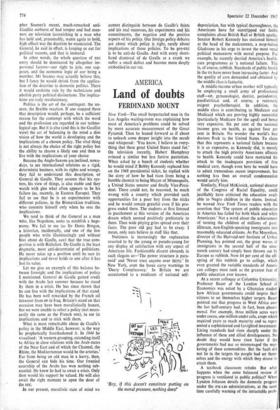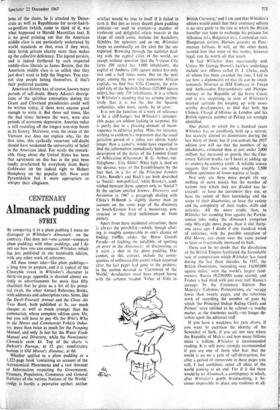Land of doubts
AMERICA FERDINAND MOUNT
New York—The small bespectacled map in the Los Angeles waiting-room was explaining how most of America's problems could be solved by more accurate measurement of the Great Pyramid. Then he leaned forward as if about to unleash some deeper insight into the occult and whispered : 'You know, I believe in every- thing that these great United States stand for.' On television recently, Hubert Humphrey evinced a similar but less furtive patriotism. When asked by a bunch of students whether he would mind if Bobby Kennedy replaced him on the 1968 presidential ticket, he replied with the story of how he had risen from being a humble chemist to being Mayor of Minneapolis, a United States senator and finally Vice-Presi- dent. There could not, he reasoned, be much wrong with a country which provided such opportunities for a poor boy from the sticks and he would remain grateful even if his pro- gress ended there. The students at first listened in puzzlement at this version of the American dream which seemed positively prehistoric to them. Then wide pitying grins spread over their faces. The poor old guy had to be crazy. I mean, only nuts believe in stuff like that.
Nuttiness is increasingly the explanation resorted to by the young or pseudo-young for any display of satisfaction with any aspect of American life. Fashionable dissent abounds in such slogans as—`The power structure is para- noid' and 'Never trust anyone over thirty.' In New York, even the buses carry warnings to `Decry Complacency.' In Britain we are accustomed to a modicum of national self-
'Boy,-,...., if this doesn't constitute putting on the moral pressure, nothing does!'
depreciation, but with typical thoroughness, the Americans have far outstripped our feeble complaints about British Rail or British apathy.
Senator Robert Kennedy has stationed himself at the head of the malcontents, a mop-haired Gladstone in his urge to invest the most venal
political manoeuvre with moral purpose. For example, he recently decried America's health.
care programmes as 'a national failure. This is, of course, rubbish. Standards of public health in the us have never been increasing faster. And the quality of care demanded and obtained by the middle class is fantastic.
A middle-income urban mother will typically be employing a small army of professional staff—GP, gynaecologist, dentist, periodontist, paediatrician and, of course, a ruinously exigent psychotherapist. In addition, the
middle class is contributing to. Medicare and Medicaid which are proving highly successful. (particularly Medicare for the aged) and hence
very expensive. Six per cent of the national
income goes on health, as against four per cent in Britain. No wonder the world's best
doctors flock to the United States. To claim
that this represents a national failure because it is so expensive, as Kennedy did, is, merely
to attack the high priority Americans allocate to health. Kennedy could have restricted his attack to the inadequate provision of free medical care, though even here he would have to admit tremendous recent improvement, but nothing less than an overall condemnation would satisfy him.
Similarly, Floyd McKissick, national director of the Congress of Racial Equality, could justifiably have criticised the education avail-
able to Negro children in the slums. Instead, he wowed New York Times readers with the
assertion that 'The system of public education in AMerica has failed for both black and white Americans.' Not a word about the achievement of turning the children of millions of poor, illiterate, non-English-speaking immigrants into reasonably educated citizens. As Pat Moynihan, director of the Harvaul-mrr Institute of Urban Planning, has pointed out, the great waves of immigrants in the second half of the nine- teenth century had simply been thrown out by Europe as rubbish. Now 64 per cent of the off- spring of this rubbish go to college, which even granted the variable standards of Ameri- can colleges must rank as the greatest -feat of public education ever known.
At a recent colloquy at Columbia University, Professor Bauer of the London School of Economics was asked by a Ghanaian student how African governments could inspire their citizens to set themselves higher targets. Bauer
pointed out that progress in West Africa over
the last half-century had, in fact, been pheno- menal. For example, three million acres were under cocoa, one million under cola, crops which required years to reach maturity and so repre- sented a sophisticated and farsighted investment.
Living standards had risen sharply under the influence of these and allied developments. No doubt they would have risen faster if the
governments had not so mismanaged the mar- keting of these commodities. But the fault did not lie in the targets the people had set them- selves and the energy with which they strove to attain them.
A textbook classroom rebuke. But what happens when the same balanced review of progress is ventilated in public politics? When Lyndon Johnson details the domestic progress under the JFK-LRT administrations, at the same time carefully warning of the intractable prob- lems of the slums, he is attacked by Demo- crats as well as Republicans for never-had-it- so-goodism (which, come to think of it, was what happened to Harold Macmillan too). It is no good pointing out that the American middle class is not particularly undertaxed by world standards or that, even if they were, their lavish private charity more than makes up the collective deficiency. The legend persists, and is indeed furthered by such respected middle-class liberals as James Reston, that the American middle class is so selfish that they just don't want to help the Negroes. You can- not stop people hating themselves, if that's their preferred pastime.
American history has, of course, known many periods of self-doubt. Henry Adams's descrip- tions of the spiritless atmosphere during the Grant and Cleveland presidencies could well be written today, if there were anyone good enough to write it. But those sad times, like the bad times between the wars, were also periods of economic depression. America today is still rounding off the longest non-stop boom in its history. Moreover, even the strain of the Vietnam war does not explain why, for the first time, this cyclically recurrent self-doubt should have weakened the universality of belief in the American ideal. For surely the remark- able thing about the United States has been that agreement on this has in the past been loudly proclaimed by everybody from Barry Goldwater on the radical right to Hubert Humphrey on the populist left. Now even Pyramidalists feel it more appropriate to whisper their allegiance.



































 Previous page
Previous page